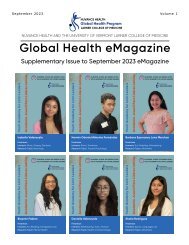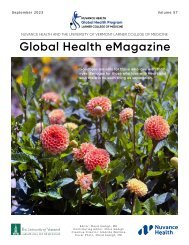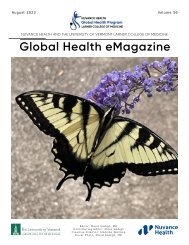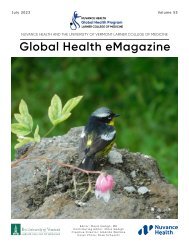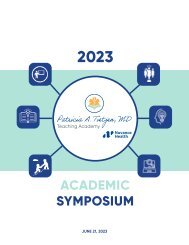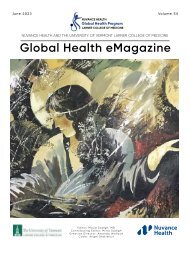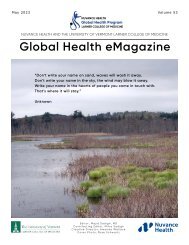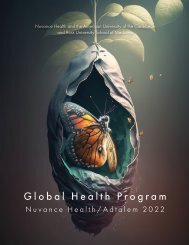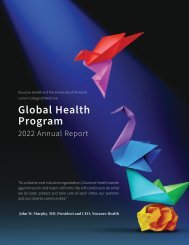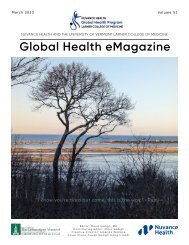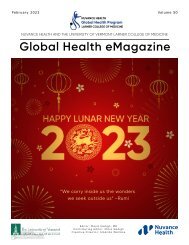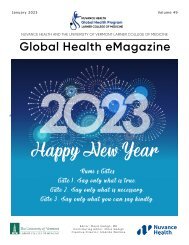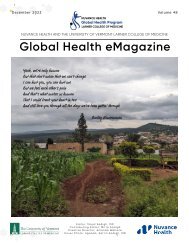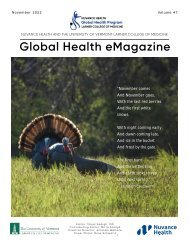eMagazine April 2023
You also want an ePaper? Increase the reach of your titles
YUMPU automatically turns print PDFs into web optimized ePapers that Google loves.
OUR PEOPLE,<br />
OUR MISSION<br />
Global Health<br />
<strong>eMagazine</strong><br />
<strong>April</strong> <strong>2023</strong><br />
Perspectives<br />
Reports from the Field<br />
Highlights<br />
Reflections<br />
Nursing Division<br />
Women’s Health Education<br />
Hispanic/Latinx Community<br />
Ugandan Voices<br />
Innovation and Technology<br />
Our Beautiful Planet<br />
Art to Remind Us of<br />
Who We Can Be<br />
Video of the Month<br />
Announcement<br />
New Publications<br />
Article of the Month<br />
Welcome<br />
Among the Letters<br />
Congratulations<br />
Photo News<br />
Calendar<br />
Global Health Family<br />
Resources<br />
Previous Issues of<br />
the <strong>eMagazine</strong><br />
Written by Beth West<br />
Director, Nuvance Health Patricia A. Tietjen, MD<br />
Teaching Academy<br />
Nuvance Health Global Health<br />
Intercultural Initiative; Part II<br />
Other factors to consider which add complexity<br />
to the design and delivery of an intercultural<br />
curriculum is the broad diversity of potential<br />
audiences within Global Health who will engage<br />
in this intercultural initiative. There are significant<br />
differences in education, experience, and<br />
worldview between medical students, residents, and physicians. Furthermore,<br />
participants will each bring their own distinct cultural perspectives. Any<br />
intercultural development curriculum should prepare them not only to engage<br />
with diverse partners at any of our nine overseas affiliated locations but should<br />
also prepare intercultural learners for the diverse patients they may encounter<br />
in their daily work, wherever that may ultimately be. These factors combined<br />
create a fascinating yet dizzying amount of unique perspectives that challenge<br />
the existing frameworks of intercultural curriculum in their ability to truly address<br />
such varied needs in a meaningful, significant way. Therefore, my initial research<br />
question is an optimistic, but broad one; how can we create accessible and<br />
appropriate programming in order to support the intercultural development of<br />
all members of our diverse Global Health community?<br />
As Mews et al. (2018) indicate, there is a unique synergy and opportunity for<br />
cultural competence education at the crossroads where global health in medical<br />
education intersects. The proposed intercultural Global Health initiatives will<br />
be designed for a phased delivery to different audiences (medical students,<br />
residents, and physicians) both in the U.S. and abroad. Recognizing that most<br />
intercultural training tools have been generated from Western paradigms<br />
with questionable application in non-Western settings (Deardorff, 2020),<br />
further review of extant literature and resources will focus on the discovery of<br />
intercultural teaching and learning curriculum and tools embodying non-western<br />
perspectives and their application in non-U.S. environments. Initially, myself and<br />
a dyad clinical colleague from the University of Vermont, Dr. Andrea Green, will<br />
work together to complete this literature review and a formal needs assessment<br />
to inform a tentative program design utilizing backward design, as suggested by<br />
Harvey (2017). The proposed curricula will then go to a diverse international and<br />
interdisciplinary committee of Global Health faculty for TACCT review, discussion,<br />
and revision. Intercultural training within medical education should, according to<br />
Fox (2005) move beyond cultural patterns and intercultural differences, improving<br />
communication skills, or role modeling interactions with patients. Fox argues the<br />
goal is to reach a deep level of knowledge and understanding of at least one<br />
society other than one’s own (2005). With this in mind, while we are still in the<br />
earliest stages of this program development, we imagine that instruction and<br />
delivery of these intercultural learning modules will be held in various countries<br />
with whom Nuvance Health has partnerships. We are excited and grateful for<br />
3<br />
Perspectives continued on next page >>




